
Media Bias More Dangerous Than Trump’s
Media bias is getting a lot of lip service these days, but the kind of bias I’m writing about is not the intentional, obvious, or product-of-paranoia bias you might hear U.S. presidential candidate Donald Trump complaining about. The kind of bias I’m concerned about is dangerous because it’s NOT so obvious.
“The mythology of your culture hums in your ears so constantly that no one pays the slightest bit of attention to it.”
― Daniel Quinn
Here are two recent examples from the media:
Global Economic Growth ‘Sliding Back into the Morass’
Two Fed GDP Trackers Show Economic Growth Wilting
In most cases pro-growth media bias is not intentional; the journalists actually believe economic growth is unquestionably good and physically possible in perpetuity. Why? Because they’ve grown up drinking the same pro-growth Kool-Aid they’re now dispensing. In the Financial Times story, Chris Giles pours this glass:
“The global economy is faltering again with growth rates ‘sliding back into the morass [they have] been stuck in for some time’, according to the Brookings Institution-Financial Times tracking index.”
In Giles’ defense, he’s apparently quoting the pro-growth neoliberal economists at the Brookings Institution. The problem is, Giles takes Brookings’ pro-growth stance as a universal truth, when instead he should be questioning it and seeking an alternative, expert view.
We need our financial journalists to wake up and smell the coffee. Limits to growth are real. All the evidence strongly suggests we are now bumping up against those limits, and additional economic growth is either unlikely or will come with dire consequences.
But we don’t get any sense of that from these reporters. In the MarketWatch story, Jeffry Bartash serves this:
“In a publication ahead of this week’s annual meetings of the International Monetary Fund and World Bank, the results will reinforce fears that many countries have become caught in a vicious circle of low growth, popular discontent and a backlash against trade and openness, resulting in more economic weakness.”
Low growth is characterized as a “vicious circle” and “economic weakness.” I promise you there are credible experts who would call slow or no growth “a necessity,” “unavoidable,” “more sustainable,” and even “healthier.” Why don’t we hear from them? Journalists go out of their way to seek out nutcase climate deniers in the interest of balance. Why will they not seek balance on a topic where it will turn out the nutcases are the pro-growthers who have been getting all the press?
I could go on with more examples of bias from these stories, but I think you get the point. The question is, do Chris Giles and Jeffry Bartash? Here are a few useful links for journalists who want to get this right:
“Once you learn to discern the voice of Mother Culture humming in the background, telling her story over and over again to the people of your culture, you’ll never stop being conscious of it. Wherever you go for the rest of your life, you’ll be tempted to say to the people around you, “how can you listen to this stuff and not recognize it for what it is?”
― Daniel Quinn
Join me in celebrating enlightened thinking and busting pro-growth bias in the media. Click this button:
Tags: economic growth, economy, gdp, gdp growth, limits to growth
Trackback from your site.
